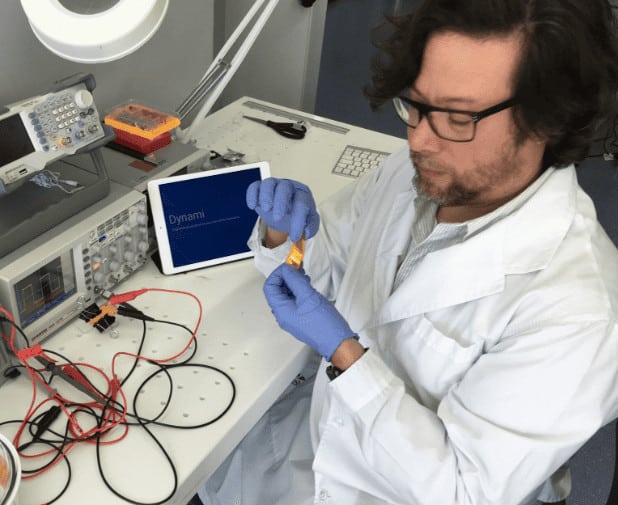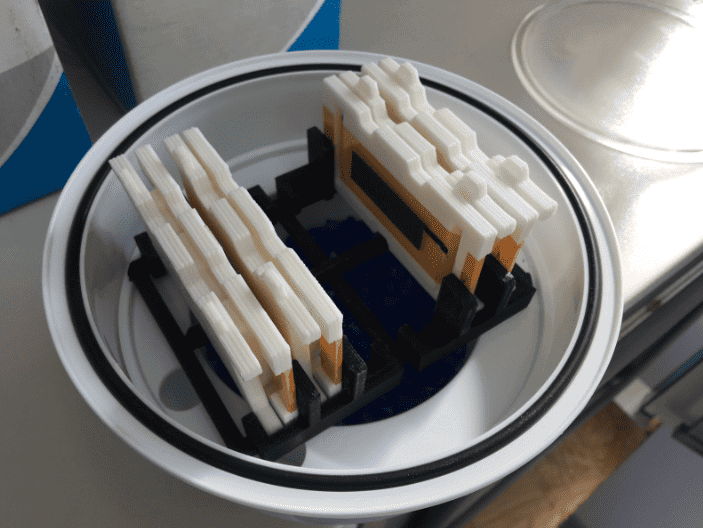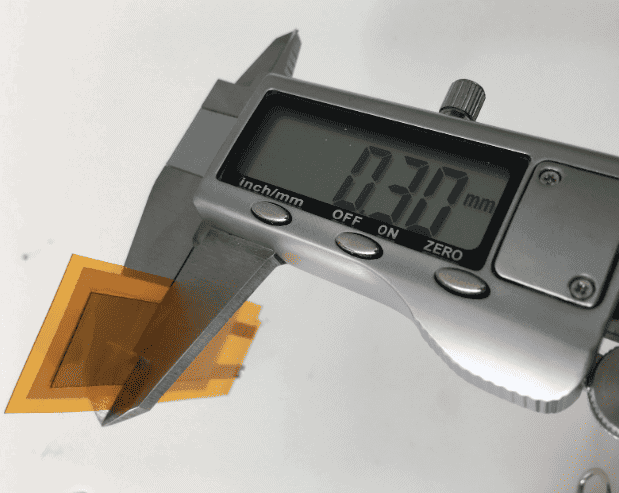Written by Victor Cortés and Vanesa Listek
Contxto – Lithium batteries embody potential. Although they’ve existed for a while, usability is still limited. Generally, products requiring lithium batteries as their main energy source must adapt to available forms on the market. Unbelievable and so inconvenient.
Considering that the global lithium battery market could earn US$1.9 billion by 2022, we assume that these slim conductors will gradually become the new norm. Until this time arrives, one Argentine firm is perfecting this technology one prototype at a time.
Say hola to Dynami, the Argentine lithium battery startup. Unlike others, it’s Latin America’s first ultrathin battery engineering firm, not to mention one of the few companies developing batteries for up-and-coming devices such as the Internet of Things (IoT), wearable technology, sensors, medical devices, etc.
Trust me when I say that this firm is revolutionizing lithium battery production by adapting to them – not the other way around. Dynami solves many issues by producing batteries in a variety of shapes and sizes, all to fulfill clients’ needs and demands.
I spoke to Sergio Baron,
Snapshot

Description: Infinite shapes of energy. Dynami develops ultrathin lithium battery technology for sleek and flexible medical
Country: Argentina/United States
Industry: Renewables – Electronics
Founders: Sergio Baron, Carlos Kaplán, Brent Goldfarb
Founding Date: March 2017

What is it?
Dynami is a U.S.-Argentine venture developing ultrathin and tailor-made lithium batteries, mostly for the IoT, wearables and medical industries. The company researches and develops technology while differentiating battery sizes.
Not only does the company create customized lithium batteries for clients, but they also concentrate on safe production and speedy delivery. Baron calls this concept efficient “lab to fab” time – from the first moment a client approaches the company until the product arrives at the customer’s door.
How does it work?
In the grand scheme, these customized batteries try to fit clients’ demands and needs. The startup creates batteries to be compatible with other products instead of the product adapting to the battery shape. This increases product usability while making them more durable, too.
Baron said that what differentiates Dynami from other lithium battery manufacturers is the innovative shape of battery cells. According to the co-founder, the firm uses a patent-pending battery assembly machine for prototype creation.
Why is this important?
Let’s begin by saying that Sony launched the first lithium battery in 1993. In the early 2000s, there still weren’t a lot of lithium-powered products, either. This started to change in the last 15 years with an avalanche of new products coming into the market.
It’s a shame that the industry still lags behind since numerous products depend on lithium-powered technology. Lithium battery technology is crucial to run modern medical devices, for example. Machines using standard alkaline batteries tend to be impractical and heavy.
Take the glucose monitoring system, for example, that treats diabetes patients. The batteries used in most are so big that the process to prick your finger and draw blood is very uncomfortable.
Moreover, lithium batteries are far more advanced than any predecessor. They are known for having a high charge density (long life) as well as a high cost per unit. The smaller and more lightweight they are, the easier to transport them as well.

Story
Baron earned his Masters in Electrical Engineering from the University of Maryland. The US government financed his research in flexible and small lithium batteries. Unfortunately, the market wasn’t ready at the time. When he returned to his native Argentina a few years later, he found unmet market
At the time, the Argentinian government was providing funding, the academics were already doing research, mining companies were willing to supply the mineral and investors were already spotting the opportunity. What was missing included entrepreneurs and private companies taking action.
It was as if every single piece was already aligned, but there was just one missing element remaining. This was the most important piece, however. That’s when he started
Baron told me Argentina and Bolivia currently produce 85 percent of the lithium worldwide. These countries have an advantage since they’re already recruiting and mobilizing talent in the industry. Naturally, the next step was to jump in and start taking advantage of the emerging ecosytem.
When I commented on how interesting it was that no one else was doing the same, he told me that it was a risky business decision. This isn’t so much the case anymore considering that the company has communicated with Nike and Fitbit to manufacture more wearables powered with lithium batteries.
Dynami appeared on the market thanks to the Argentine Foundation for Nanotechnology. This is where the startup designs prototypes for its star products. The batteries developed are built from lithium and sizes vary depending on client demands. Some of them have a width of about 300 microns (0.3 millimeters).
Status
Today, the startup has
Over the past six months, the startup has secured new clients, especially in the United States where it is also raising capital. Moreover, officials work with a big semiconductor company in California pioneering the IoT market.
Most of the startup’s clients are international and currently in the pipeline, so the majority of projects are confidential. Hopefully someday soon we will know more specifics about

Business Model
Two routes of revenue exist for Dynami. First off, the company earns a margin between product cost and price. Secondly, sometimes it makes royalties when the client is big enough to directly manufacture with the producer. In this case, Dynami keeps intellectual property and engineering design.
Venture Funding
Dynami is currently raising a seed capital round!
Future
Besides conquering the world, Dynami plans to expand to the United States and steadily grow the team. In 2019, the fiscal goal is what the CEO calls the 2+2+2 method. In other words, the Argentine startup wants to secure two new international clients, two new patents and two new fabrication partners in Asia.
Thoughts
Indeed, lithium batteries are substantially pricier, although they do have clear advantages compared to regular alkaline batteries. Not only can they endure the most extreme temperatures but they also last much longer and weigh practically nothing.
All in all, we need more lithium batteries to elevate new industries. Let’s call it investing in the future in hopes of finding the most sustainable yet effective energy resource.
-VC






